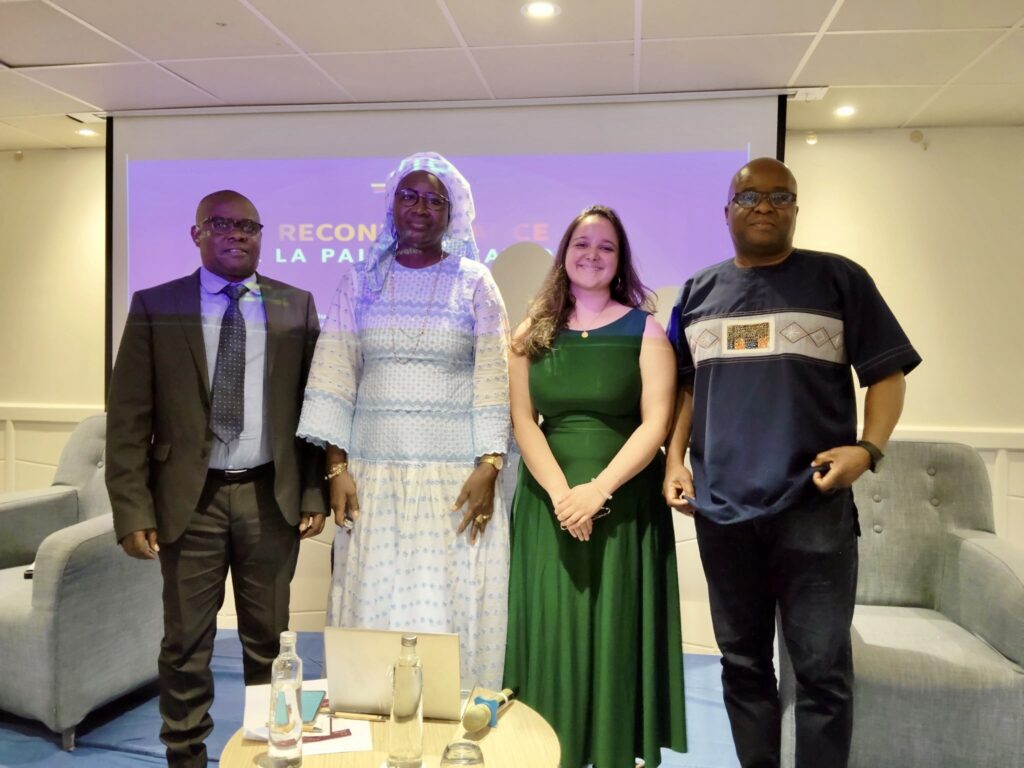
Panel speaking on “Towards the Certification of Peer Education – Challenges and Modalities”. Speakers (from left to right): Dr Joseph Nyandwi (INSP – Burundin), Prof. Ndeye Fatou Ngom (Bambey University UFR Health and Sustainable Development/CTA Fann – Community Health Impact Coalition), Ms Soufia Bham (external presenter of Africa Centre PgDip Community Resource Mobilisation course, Coalition PLUS) and Dr Munya Saruchera (Director for the Africa Centre for Inclusive Health Management)
The official launch of the REPAIR Project in Dakar, Senegal, represents a pivotal moment in Africa healthcare and a significant step towards the professionalisation of peer educators across the continent.
The launch of the REPAIR Project (REconnaissance de la PAIR-Education) in Dakar, Senegal (15–18 September 2025), marked a milestone in advancing inclusive health systems across Africa. Led by Coalition PLUS, the project seeks to formally certify peer educators – trusted community actors who have long played an essential role in the response to HIV, tuberculosis, viral hepatitis, sexually transmitted infections, and gender-based violence.
Peer educators bridge the gap between health services and marginalised populations, yet their work has too often remained informal and undervalued. The REPAIR Project addresses this by establishing a professional framework of competencies, training, and certification, positioning peer educators as recognised practitioners rather than volunteers.
Bringing academic credibility to community health
As a core partner to REPAIR, the Africa Centre for Inclusive Health Management, part of Stellenbosch University, is specifically tasked with providing academic validation and certification for peer educators across Africa. This partnership with Coalition PLUS, established in 2023, builds on the Centre’s longstanding expertise in developing academic programmes that strengthen leadership and management in health systems, particularly in the field of HIV/Aids.

The Centre’s involvement lends the project academic credibility and ensures peer educators’ skills and knowledge are formally recognised. It also represents a natural extension of existing collaborations: in 2024, Coalition PLUS contributed to the Centre’s Postgraduate Diploma in HIV/Aids Management by delivering a module on community resource mobilisation.
From informal practice to professional recognition
The Centre was represented in Dakar by Dr Munya Saruchera, Director, who joined the opening panel, “Towards the Certification of Peer Education – Challenges and Modalities.” Alongside colleagues from Burundi and Senegal, Dr Saruchera highlighted the opportunities and complexities of embedding certification frameworks in national health systems while protecting the community-driven ethos of peer education.
“Peer educators are the heartbeat of inclusive health,” Dr Saruchera reflected. “Certification is not about adding bureaucracy, but about valuing lived expertise and giving it formal recognition. This creates pathways for professional growth and ensures that peer educators are integral to the very fabric of our health systems.”
A step towards equity
The Dakar launch brought together peer educators, policymakers, researchers, and health professionals to co-create a roadmap for certification pilots in Senegal and Burundi. The roadmap includes competency frameworks, advocacy strategies, and mechanisms for monitoring and evaluation.
For the Africa Centre, this partnership reflects its mission to develop socially responsive leaders and strengthen inclusive health management across the continent. By formally recognising peer educators, REPAIR not only enhances community-led health responses but also advances universal health coverage and equity for all.
